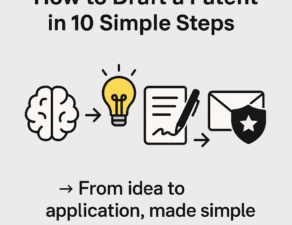3 Mistakes Inventors Make
Incorrect timing for product sale or public disclosure
In the United States, you have a 12 month “grace period” to file a provisional or nonprovisional patent application from the date your invention was first sold or published (i.e. posted on the internet). Although you have 12 months to file from your first sale, we strongly recommend you never sell or offer for your sale your invention until you have filed your patent application. The USPTO (United States Patent and Trademark Office) works on a first to file basis. Therefore, if someone sees your invention for sale and applies for a patent, you will have the added challenge of proving they are not an inventor.
Similarly, if you plan to get patent rights in countries outside of the United States, you will face challenges if you advertise or use your invention publicly prior to filing a patent application. For countries outside the United States, there is no grace period and a patent application must be filed before advertising or selling the invention.
The timing of going public with your invention is critical to obtaining patent rights.
Poorly written provisional patent applications
Provisional applications can be a very good tool to begin protecting your invention. There is a trap, however, that many inventors fall into with provisional applications. A provisional application can be filed without the same level of preparation that is required for a nonprovisional application. Inventors may believe that a provisional application is simple, easy, and less expensive. Many provisional applications filed by inventors themselves or low cost non-attorneys do not provide the proper protection. To properly reserve patent rights, a provisional application must meet the same standards of disclosure as a non-provisional application and must describe the invention with the same level of detail. If the application is poorly written, it may be worthless. And worse yet, if your invention is not protected by the provisional application, and you sell the product prior to filing the non-provisional, you may exceed the 12 months deadline to file a patent application. Missing the 12 month deadline would forever prevent you from having the patent rights. So, poorly written provisional applications can result in the unexpected negative consequence of not protecting your rights and the lost potential of the asset.
Not using professionals for your patent searches
Often inventors tell us they do not need a patent search. They know their industry and are confident their invention has never been done before. This is very possible. We do encourage our inventors to research the market, scour the internet, even do a search of published patents. Remember, you are looking for a needle in a haystack and are hoping to not find the needle. If the inventor finds their invention, they may be done. However, this is only the first step. If an inventor doesn’t find anything, we then recommend doing a complete professional search. Our professionals are experienced and have many tools to find other inventions that are similar, or relevant to a patent application. A patent search may not result in finding the exact invention. It will often yield inventions that are similar. A quality patent application will use this information from the patent search to prepare the broadest claims possible. If a patent search does reveal patently similar prior publications, you will save a lot of money. Either way a patent search is a win-win situation. Either you save yourself a lot of money, or you get a better patent.
Can I Do My Own Patent Search?




